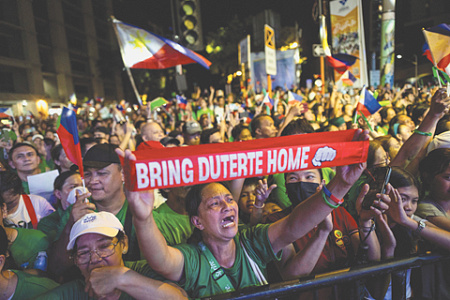
The elections in the Philippines have brought success to former President Rodrigo Duterte, who is imprisoned in The Hague awaiting the verdict of the International Criminal Court (ICC). The former president and former mayor of Davao City is accused of crimes against humanity during his campaign against the drug mafia. The ICC has collected testimonies from relatives of those people whom the police eliminated without court approval. But Davao residents do not trust foreign jurisprudence. They gave the overwhelming majority of votes to Duterte. As a result, the prestige of the ICC has been damaged.
The internal political struggle in the Philippines, an island nation in Southeast Asia, rarely gets into the focus of the press in the West. But at the moment, many reputable publications are writing about it. The fact is that the views of the outstanding legal minds working in The Hague and the citizens of the Philippines have radically diverged. The conflict did not arise from scratch. 80-year-old Rodrigo Duterte, who was previously mayor of Davao City and was later elected president of the entire country, became famous for his ruthless campaign against the spread of drugs. The bigwigs of the drug business controlled slums in many cities a couple of decades ago. Duterte began to restore order, first in his native Davao, and subsequently nationwide. At the same time, the guards did not particularly care about the observance of the law, putting suspects against the wall.
The woman told The Guardian newspaper that three of her underage sons were killed during this campaign. The relatives of the victims, with the help of human rights activists, began to write appeals to the ICC. Meanwhile, Duterte resigned as president. Ferdinand Marcos Jr., the scion of an influential clan and the son of the former president (now deceased), was elected head of state. At that time, the Duterte and Marcos clans were working together. And then a feud began between them. And that’s what it led to. In March, Duterte tried to leave the country. But he was arrested at Manila airport and handed over to the ICC in The Hague. Now he is behind bars.
So the ex-president’s career has come to an end? Not at all. According to the laws of the Philippines, people in prison have the right to run for election. And Duterte used this provision in the legislation, putting forward his candidacy for mayor. The elections were held on Monday, and the entire House of Representatives, part of the Senate, and many local authorities were to be re-elected. The results have already been partially announced officially. Duterte received an overwhelming majority of votes in his city.
Sebastian Duterte, the youngest son of the winner, was proclaimed vice mayor of Davao. Paolo’s eldest son was re-elected to the House of Representatives, and two grandchildren won the local elections. This, the AP agency states, indicates that the Duterte clan is gaining points, and the Marcos clan is losing them. However, the results of the Senate elections will be announced in a week. Namely, the Senate will have to decide the fate of Sarah Duterte, the daughter of the former president, who now holds the post of vice president of the country. The results of the Senate elections will be announced later. And it depends on their outcome whether Sarah will be impeached. She is charged with stealing public funds and attempting to organize the assassination of President Marcos Jr. To avoid impeachment, Sarah needs the support of at least 9 senators out of 24. And if the impeachment takes place, Sarah will lose the right to hold elected office and will not be able to run for president in the elections to be held in 2028.
Gene Franco, a professor at the University of the Philippines, says the situation is not clear. If the Senate is provided with evidence of wrongdoing on Sarah’s part, she may be impeached. But for now, observers are predicting good luck for Duterte’s supporters. The question is whether one side or the other will resort to violent methods to defeat the opponent. President Marcos said that although he was disappointed by the vote, the structures of democracy had stood firm.
The showdown in the Philippines may have international consequences. As head of state, Duterte pursued an independent policy. He established close economic ties with China. Russia doesn’t have many assets in the region. But Russian warships made visits to the ports of the Philippines. Marcos, on the other hand, set a course for rapprochement with the United States. The U.S. Navy and Air Force are conducting joint military exercises with the Philippines. Washington calls the Philippines its ally in countering China’s expansion.
Finally, the events in the Philippines have called into question the reputation of the ICC in The Hague. The Philippines has withdrawn from the Rome Statute, meaning it does not recognize the jurisdiction of the ICC. It is not recognized by Russia, China, the United States, and a number of other states. The question arises: does the ICC have the right to ignore the will of Filipino voters?
Bakhtiyar Tuzmukhammedov, Professor of international law, told NG: “Almost six years after the Philippines withdrew from the Rome Statute, the current Manila authorities arrested former President Duterte and handed him over to the ICC. In addition to the impression that the ICC is being used as a tool in the hands of the Marcos clan in their showdown with the Duterte clan, there is an acute legal issue of the Court’s attribution of jurisdiction over the situation in a state no longer bound by obligations under the Rome Statute.”
